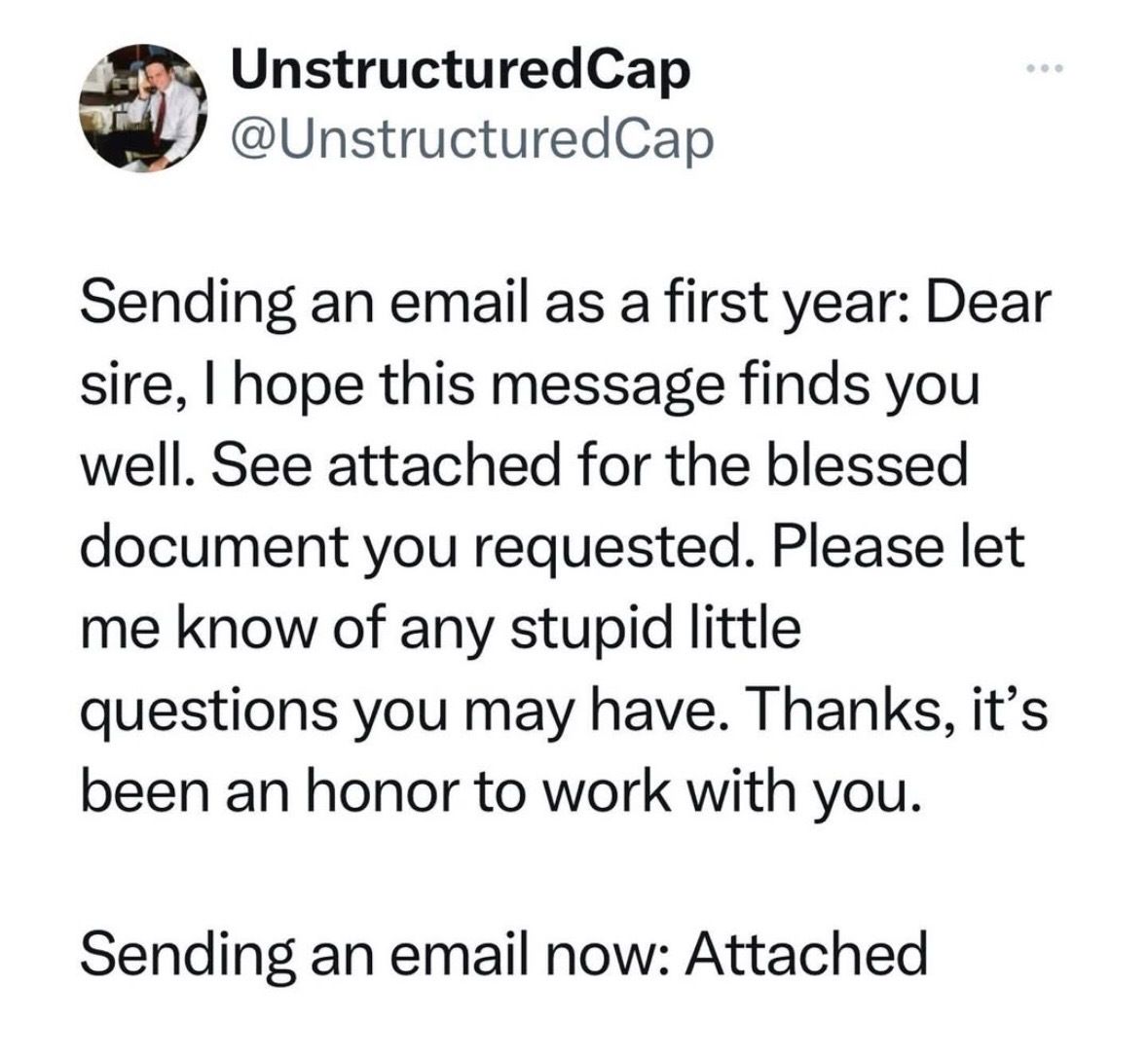If this was forwarded to you (Howdy!), you can join here
👋 G’day
Welcome back to another day of insights
Today’s brief:
Deloitte points the finger
Harvey CEO says AI will boost juniors
Court criminalises showing up to a protest
Here’s your latest 👇
WORD ON THE STREET
Deloitte’s AI refund

The Deloitte AI saga continues. Turns out the firm initially blamed “transcription issues” and implied the gov knew AI was used (it didn’t). Deloitte Australia has now repaid $98k (over 20% of its $440k fee) after admitting AI caused major errors in a federal government report. Senators want a full refund and ban: AFR
*
Harvey’s Winston Weinberg says AI will make junior lawyers more valuable, not redundant. Well, that’s a relief. Speaking at TechLaw.Fest Singapore, the 31-year-old CEO of the $5bn legal AI startup said AI is rewriting law’s apprenticeship model, letting juniors take on riskier work sooner: Point Blank
*
Linklaters associate James Phoenix turned a late-night “vibe-coding” project into a firmwide AI time-recording tool. His Narrative Checker, built with the firm’s chatbot Laila, scans thousands of billing entries a minute to fix errors and speed up review. The tool’s now rolling out globally, saving lawyers hundreds of hours a year: NB
*
Nexl, founded by former Gilbert + Tobin employee Phil Thurner, has hit a $100m+ valuation after securing $35m from US investor Tidemark Capital, led by LinkedIn backer Dave Yuan. Nexl’s software helps law firms manage client relationships and business operations. The funding will accelerate global growth of its new AI-driven product, Navidion, which offers strategic insights for law firm management: AFR
PRACTICE POINTS
Bullying claim falls flat
In a recent decision, the Fair Work Commission dismissed an employee’s claim that her employer’s refusal to let her continue working remotely and take on a second job amounted to workplace bullying. Ms Craig argued the decisions were unreasonable and had caused her anxiety and emotional distress, supported by a medical certificate linking her symptoms to “bullying.” The Commission disagreed, finding the dispute was simply about working arrangements, not repeated unreasonable behaviour. Even if the directions were strict, they weren’t “intrinsically of a bullying nature” and did not create a health and safety risk. Feeling distressed after a managerial decision does not turn ordinary employment disputes into bullying claims: Allens
*
APRA has disqualified two former Xinja Bank directors after finding they misled the regulator over a 2020 capital raising. Former CEO Eric Wilson was banned for 8 years, and director Craig Swanger for 10 years, after APRA uncovered undisclosed “side agreements” with investors that invalidated Xinja’s capital classification. APRA found Wilson failed to act with due care and diligence by allowing the misreporting, while Swanger altered documents to conceal that the capital was wrongly classified. Deputy chair Margaret Cole called the misconduct “serious failures” that went to the heart of bank capital integrity. The case marks APRA’s first-ever disqualification under the Financial Accountability Regime and is a signal that it will use the new regime to tighten accountability in the banking sector: AFR
*
Australia is set to tighten transparency around beneficial ownership under a new Bill. The reforms bring equity derivatives squarely into the substantial holding regime, requiring investors to disclose both cash-settled and physically settled derivative positions once the 5% threshold is reached, when combined with conventional holdings. The Bill also extends the rules to foreign-incorporated but ASX-listed entities and gives ASIC new powers to freeze securities where disclosure breaches occur. The new framework, set to commence in late 2026, aligns Australia’s regime with global standards on disclosure and ownership transparency: Clayton Utz
TALKING POINTS
Protests criminalised

A landmark NSW Court of Appeal ruling now makes it a crime to attend a banned protest, sparking alarm among human rights advocates. The decision, which blocked a pro-Palestine march to the Opera House, means protesters could be charged or found in contempt simply for showing up: The Guardian
*
High Court Justice Simon Steward says it’s “only a matter of time” before directors get sued for dragging companies into social or political debates like the Voice or marriage equality. In a speech to Melbourne Law School, the court’s resident conservative warned that unless “woke” corporate activism clearly benefits shareholders, it could breach directors’ duties: Capital Brief
*
Mary Kostakidis has failed to convince the Federal Court that criticism of Israel can never breach the Racial Discrimination Act. Judge Stephen McDonald ruled that speech targeting Israel could be unlawful if motivated by Jewish racial or ethnic origin, allowing Zionist Federation CEO Alon Cassuto’s case to proceed. The lawsuit centres on two X posts where Kostakidis shared videos by a Hezbollah leader, prompting claims of racial vilification: The Australian
DEAL ROOM
Merger lawsuits rise
In Delaware, where most big US companies are incorporated, boards are learning it’s cheaper to buy forgiveness than seek permission. A Cornerstone Research study shows merger-related settlements have quadrupled since 2014, with most costing under 5% of deal value. Companies like Dell, which paid $1bn to end its VMware suit, now see such payouts as smart trades, not setbacks: Financial Times
*
MinRes: has tapped JPMorgan and Argonaut Securities to review its WA lithium portfolio, including stakes in Wodgina, Mt Marion and Bald Hill, as it wrestles $5.4bn in debt and a 90% price slump. It’s not a formal sale yet, but insiders say Chris Ellison’s miner is open to parting with assets, marking its second lithium rethink in 3 years: AFR
*
South32: has tapped Macquarie Capital to run the potential $1bn sale of its Cannington silver mine in northwest Queensland, one of the world’s largest silver and lead producers. With silver prices near US$47/oz, buyers like Sandfire, Fortuna and Pan American Silver are circling: The Australian
SECTOR SPECIFIC
Global ChatGPT boom

🚜 DIGGERS
Ford has slashed its lithium offtake in half with Gina Rinehart-backed Liontown Resources, citing weaker EV demand. The deal now covers 256,000 tonnes. But it gives Liontown a one-year loan repayment break and the freedom to sell more lithium on the open market as prices rebound above $US800/t: AFR
*
Citigroup and Macquarie Capital ran a $688m block trade in Capstone Copper for major holder Hadrian Capital Partners, offloading 6.6% of shares at a 6.7% discount. Hadrian keeps a 6.7% stake and says it’s done selling. With copper topping US$10k a tonne and Capstone’s stock up 45% this year, timing’s looking sharp: AFR
🏦 FIN
ANZ’s new CEO Nuno Matos is tapping his old network to fuel his 3,500-job overhaul, poaching senior execs from McKinsey, Santander and HSBC. Pedro Rodeia joins as retail chief, Christine Palmer as CRO, and Donald Patra as CIO. Fresh from a $240m misconduct penalty, Matos is betting familiar faces can clean up ANZ’s risk and retail woes: Bloomberg
*
UBS analyst Tom Bodor is jumping ship to Jarden Australia, taking on the role of head of real estate research in early 2025. He replaces Lou Pirenc, who’s stepping away after 25 years. Bodor, a Lendlease alum with two decades in REITs, joins as Jarden keeps bulking up its property coverage with ex-UBS heavyweights: AFR
🏠 RETAIL & REAL ESTATE
Guzman y Gomez shares rose 4.6% to $28.24 after the burrito chain posted 18.6% Q1 sales growth and announced a $100m buyback. Analysts called the buyback “unexpected” given GYG’s capital-heavy rollout, but the group reaffirmed plans to open 32 new restaurants this year: Capital Brief
*
Rebel Property Group and Capitel Group have scored planning approval to demolish the Double Bay InterContinental Hotel and build a $1bn mixed-use precinct. The eight-storey project will feature luxury apartments, retail, and offices, targeting wealthy downsizers: The Australian
📱 TECH & STARTUPS
ChatGPT is now used by 10% of the world’s adults, with about 700 million monthly users as of July and 800 million weekly users today. The chatbot now handles 2.5 billion messages a day, or 29,000 per second, making it the fastest-spreading technology in history and far ahead of rivals like Grok and Claude: Business Insider
*
22-year-old Alisa Wu, founder of Lucent, has raised $2m in just 36 hours —without a co-founder, product, or staff. Her startup provides browser interaction data to train AI agents that complete online tasks like booking flights and filling forms. Backed by Long Journey Ventures, Horizon VC, and others, Wu says AI tools like ChatGPT let solo founders move fast: Capital Brief
JOB OPPORTUNITIES
P.S.

Till next time,
-Team PB


